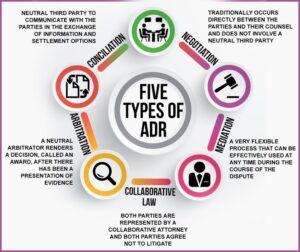Recently, Parliamentary Standing Committee on Law and Justice has recommended substantial changes to the Mediation Bill, 2021.
- The bill introduced in Rajya Sabha in December, 2021, with an aim to reduce the pendency of cases in courts.
MEDIATION BILL:
- The objective of the bill is to settle any civil or commercial disputes through mediation before seeking court or tribunal’s intervention.
- After two mediation sessions, a side may withdraw from mediation.
- The mediation procedure must be completed within 180 days, which the parties may extend by another 180 days.
- The India Mediation Council will be established to regulate the whole process.
- Its tasks include registering mediators and recognising mediation service providers and mediation institutes.
- Further, the agreements resulting from mediation will be binding and enforceable in the same manner as court judgments.

MEDIATION:
- Mediation is a voluntary, binding process in which an impartial and neutral mediator facilitates disputing parties in reaching a settlement.
- A mediator does not impose a solution but creates a conducive environment in which disputing parties can resolve all their disputes.
ISSUES WITH THE BILL:
- The Bill makes participation in pre-litigation mediation mandatory. Mediation is a voluntary dispute resolution process. On one hand, this could lead to more out of court settlements and reduce the pendency in courts. On the other hand, mandating mediation goes against its voluntary nature.
- The moment any law is made on the subject it becomes the guiding force.
- The Bill proposes a clause giving the powers to court to make rules for ‘court annexed mediation’, which is unconstitutional.
- It also raises the question on the non-applicability of the provisions of the Bill to disputes/matters of non-commercial nature involving the Government and its agencies.
- The Mediation Council requires prior approval from the central government before issuing regulations related to its essential functions. It is not clear why such prior approval is required.
- This may also be questioned since the central government may be a party to mediations.
- The Bill applies to international mediations only if they are conducted in India.
- It does not provide for enforcement of settlement agreements resulting from international mediation conducted outside India.
Way forward:
- It recommended to make pre-litigation mediation optional and further introduced it in a phased manner instead of introducing it with immediate effect for all civil and commercial disputes.
- The panel recommended that the Central Government can appoint the Chairperson and Members of the Mediation Council of India through a selection committee.
- Given the vast range of duties and obligations allocated to the Mediation Council of India, mediation councils should be established in each state.
- These State Mediation Councils should operate under the general supervision, direction, and control of the Mediation Council of India and perform such functions as it may specify.
- The panel recommended reducing the time limit from180 days to 90 days and further an extension period of 60 days instead of 180 days.
READ MORE: Daily Prelims Booster
READ MORE: Daily News Analysis

Leave a Comment